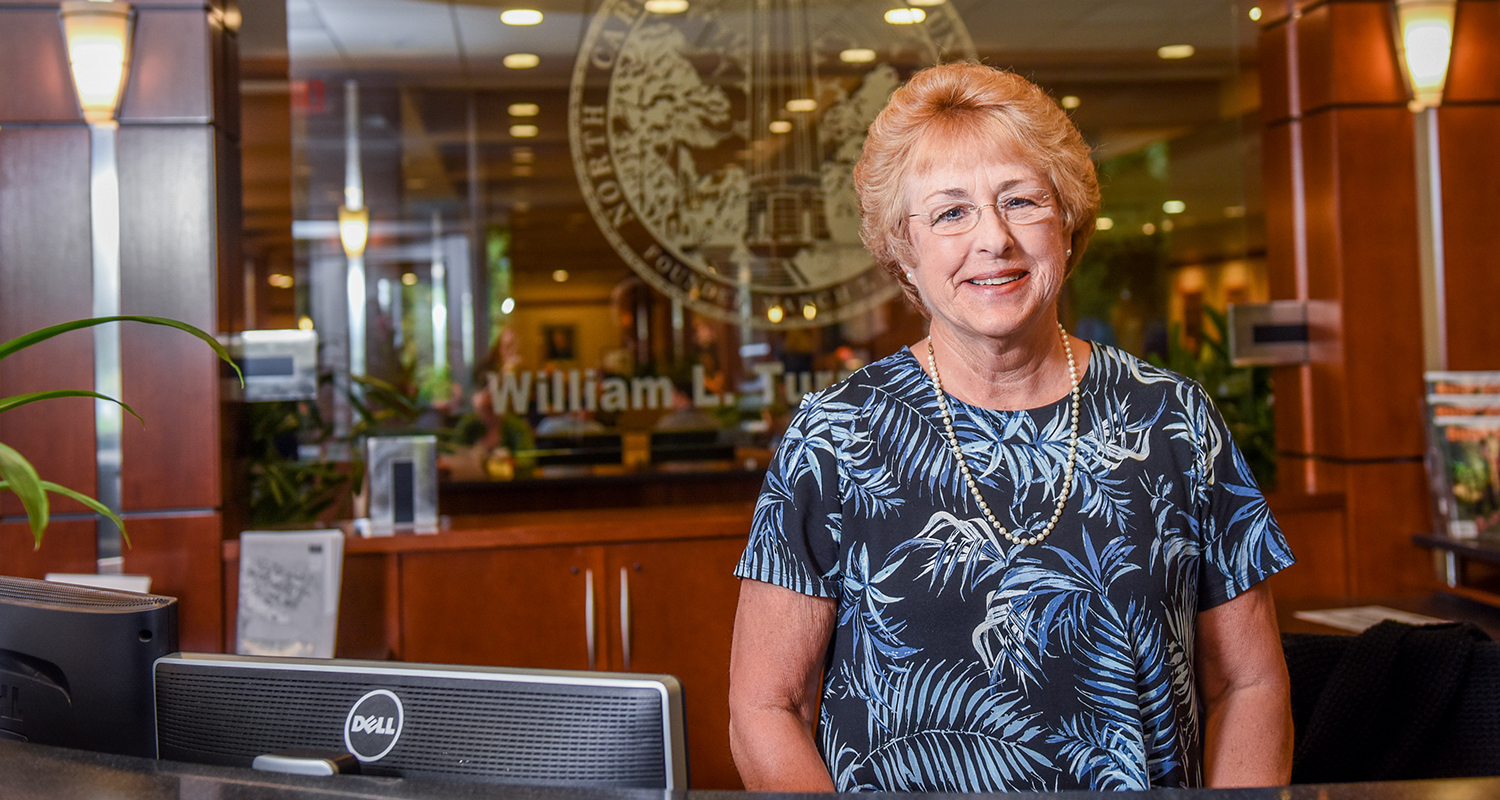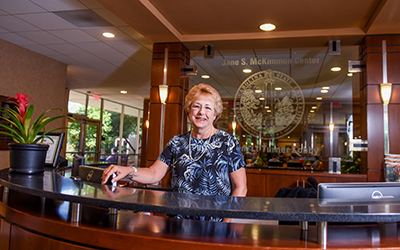A Bus, a Goat and Lots of Learning: Retiring Administrator Looks Back at Career

Alice Warren has plenty of stories to tell from her almost four decades at NC State.
There was the time she took a group of new faculty and staff to the Charlotte Motor Speedway as part of a tour to learn how the university’s research and engagement affects the entire state. The speedway operations manager offered to let the tour bus take a lap around the track.
“We brought everybody back on the bus,” Warren recalls. “The bus driver’s stoked because he’s always wanted to do this.”
As the bus hit 70 mph and leaned into the first turn, Warren felt a tap on her shoulder. It was her boss, who was regretting the whole idea.
“If you want your job on Monday, get us off this — blank — racetrack,” the boss told her.
Warren, sitting at the front, turned to the bus driver.
“And what did I say?” she says. “Go, Jim, go!”
The vice provost of continuing education is used to life in the fast lane. She’s spent her career organizing workshops, seminars, events and other learning opportunities for organizations and individuals. The McKimmon Conference and Training Center welcomes thousands of visitors in a typical week.
But come Oct. 1, Warren will walk through its doors for the last time. After 39 years, she’s ready to retire.
Day One
Warren started as a continuing education specialist at the McKimmon Center on July 1, 1979, a mere week after completing her master’s degree in vocational industrial education. She managed about 50 short courses, conferences and workshops in the Office of Professional Development, helping people of all kinds build new skills. The division continues that work today.

“It’s up to us to help train those folks, the adults primarily who are out there and need new skill sets to stay engaged with the companies they work for, because that makes an impact on the bottom line for the companies,” Warren says.
She found mentors in John Cudd and Denis Jackson, both former division leaders. As Jackson moved up the ranks, Warren took over his programs, such as the Sport Fishing School in Hatteras, now in its 65th year, that teaches people about tackle, lines, hooks, fishing techniques and the types of fish found off the coast of North Carolina.
It was hard work, but the office had fun, Warren says. The continuing ed photography students often roasted their instructors, one of whom was nicknamed “the old goat.” One day some students asked Warren if she could help them find a real goat for his roast. Warren smuggled one in from a pasture where the Joyner Visitors Center now stands and then returned it as quickly as possible.
“I didn’t need anybody from the university calling me asking, ‘Have you seen a goat? We’ve lost a goat,'” she says.
Rising Through the Ranks
After 13 years as a continuing education specialist, Warren applied for an assistant director’s job. She polished her interview skills and practiced assertiveness. She knew the obstacles she faced.
“Back then, women were not necessarily considered for a lot of those kinds of positions,” Warren says. “I’d like to think that I’ve created a spotlight on women and helped women rise up through the administrative ranks of the university.”
She also took on leadership roles outside the university, becoming chair of the University Professional and Continuing Education Association’s regional division. She spent one year as a regional representative and 10 on the national organization’s board of directors.
Warren kept moving up at work, too, with her positions including associate director for continuing and professional education and associate to the assistant vice chancellor. She served as assistant vice chancellor for extension, engagement and economic development for three years before starting in her final role as vice provost for continuing education in July 2011.
“I applied every step of the way,” she says. “I had to make the cuts. I had to be interviewed. I had to sell myself to be the best choice. I’ve just been very fortunate to have taken very purposeful steps along my career path to end up in this last seat. And I would not trade my experience for anything in the world. I would not do anything differently.”
A Center’s Mission
The McKimmon Center has faced big challenges during Warren’s time there. There was once talk of separating it from continuing education and allocating it as meeting space for the university. Warren helped Tom Miller, senior vice provost for academic outreach and entrepreneurship, and Provost Warwick Arden prepare a presentation about why that was a bad idea. She pointed out that the center’s seed money came from canning clubs — similar to 4-H clubs — almost 100 years ago.
“Our very roots for how this building was conceived came from extension work that was already going on in counties across our state,” she says.
It worked. The center remained untouched.
Warren is proud of the division’s work. The center hosts conferences and workshops and provides conveniences that help them run smoothly, such as large conference rooms and free parking. Its programs include certifications, professional development and courses and events for people age 50 and up. It served almost 232,000 people during the 2017-18 fiscal year.
The conference center works closely with others on campus, partnering with the StateView Hotel for guest rooms and consulting with faculty on course content.
“It’s been very purposeful, collaborative work,” Warren says. “I always want to invite more people to the party than maybe I really need because I want people to say, ‘Wow, she even thought to include us.’ I’ve never tried to cut people out because I saw it as a competitive thing. I see it as a collaborative thing because we’re all NC State and we’ve all got to help each other survive.”
Warren developed one program that embodies that spirit. Connecting in North Carolina takes new faculty and staff around the state to see the impact of land-grant initiatives and learn about state industry, history, culture and geography. The Charlotte Motor Speedway was one such stop, where visitors learned about the facility’s operations and economic impact before Jim the bus driver took them on the ride of their lives. Other stops have included Mt. Olive Pickles and Carolina Turkeys factories, a school bus manufacturing plant and the USS North Carolina.
Warren says she learns a lot at the sites, but she also enjoys spending time with new employees on the bus and getting to know them.
“I sit there and I go, “Wow, NC State is so lucky,” she says. “And these students who are going to be in the class with these faculty members are going to be so lucky.”
Tempted to Stay — Almost
The student body is where Warren has seen the most change.
“There’s been a big growth in the types of academic students that now come to NC State,” she says. “I mean, these kids are off the chart when it comes to community service, their coursework, their GPAs.”
University branding plays a part in that, Warren says.
“Our visuals are different. Our websites are more dynamic. Our photos tell a story,” she says. “I think our whole branding campaign has elevated a consistent message of NC State to a different level.”
Warren also praised the university administration for developing and sticking to its strategic plan.
“That’s what drives the university every day now,” she says. “Those five strategic goals. All of us are held accountable to those five goals. They are embedded in our work plans. We’ve had strategic plans ever since we’ve been here, but many of those plans became a document on the shelf. I don’t ever recall us living the strategic plan like we’re doing now.”
NC State is thriving so much that Warren was almost tempted to stay. After all, she has until her last day to withdraw her retirement paperwork.
“But no, no, it’s time. It’s time. I’m ready. I need a break.”
Warren has no immediate retirement plans. She’ll be busy with her daughter’s upcoming wedding. She’d like to spend more time at White Lake in Bladen County, where she spent her summers. She’s thought about getting a recreational vehicle so she and her husband can drive around the country — no plans, no schedule.
“My husband and daughter are still adjusting to the fact that I’m actually retiring,” she says. “My husband said I’m going to have trouble not looking at my calendar every day, but I’m looking forward to having an empty day.”
She’d like to stay productive — maybe do volunteer work or, as befits someone dedicated to continuing education, take classes through the McKimmon Center’s Osher Lifelong Learning Institute.
“Remember, you are never fully educated,” she says. “You need to be learning something every day, because that’s how you will survive in life and in this world.”


